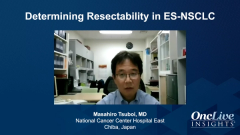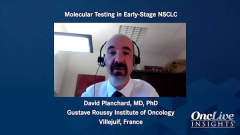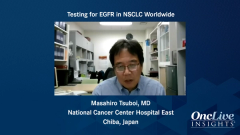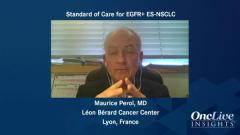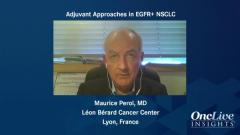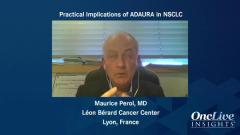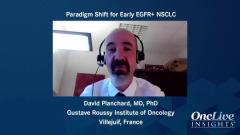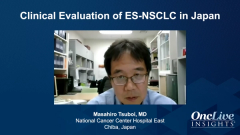
Paradigm Shift for Early EGFR+ NSCLC
Episodes in this series

Transcript:
Maurice Perol, MD: We have seen in the ADAURA study that it is possible to change the natural history of an oncogenic-addicting non–small cell lung cancer, not only in the early and late stages of the disease. This is a paradigm change in the treatment of advanced non–small cell lung cancer. These findings have a clear implication for obtaining a genomic profile in all the non–small cell lung cancer patients with non-squamous cell carcinoma, including early stage patients. We will achieve a lot of new advances by giving targeted therapy to these patients after surgical resection and after adjuvant chemotherapy if necessary. We still have many issues to resolve, especially the optimal duration of treatment. For example, should we give only 3 years of treatment, or should we maintain the drug for a longer time until relapse? This is an open and important question to address in the future.
David Planchard, MD, PhD: In 2020, adjuvant chemotherapy and platinum-based chemotherapy are still the standard of care, whatever the molecular status of the alteration, even in the EGFR-mutated population. Because of the ADAURA trial, disease-free survival can be considered a new standard of care in this population. There are other things, but it’s probably too early… We should keep in mind that in this population who have EGFR mutations…from metastatic disease evolution. Trying to prevent the brain evolution for this population with EGFR mutations is important and something that has been shown in the ADAURA trial.
One percent of patients who received osimertinib experienced brain evolution. Ten percent of patients who did not receive osimertinib achieved brain evolution. This is really important, and if you compare both arms, it was 11% of disease evolution in the osimertinib arm. It was around 40% in the placebo arm. We completely changed the landscape of evolution by reducing the probability of disease evolution and the probability of developing brain metastases in this population. There is no reason not to test patients after surgery to know if they have EGFR mutations, and we should discuss this with patients who receive this type of adjuvant treatment with osimertinib.
Masahiro Tsuboi, MD: We still need to fully analyze and discuss the introduction of the osimertinib adjuvant therapy for patients with stage IB disease. Because stage IB in the ADAURA trial is…divided into stage IB and IIA in TNM [tumor, node, metastases staging system]. Considering the number of patients with stage IB disease who are cured by the surgery alone, it is strange to conclude that the group with different prognoses can be grouped together… [There are] 2 surrogate end points for the overall survival in this population. What is the result of the first-generation TKI [tyrosine kinase inhibitor]? It’s negative in this regard. It will be interesting to see if the scenario is similar to the chemotherapy…
Secondly, there is the patient selection. Considering there are patients who are cured by surgery alone, …we should explore the direction of…adjuvant therapy to include those who are at a higher risk of the recurrence using that…science. I’m particularly interested in the ctDNA [circulating tumor DNA] intervention studies with MRD [minimal residual disease]. We also discussed the other issues, such as combination treatment with chemotherapy, optimal treatment duration, and the cost of new drugs. There seems to be a wave of precision medicine in postoperative care. Adjuvant treatment aims to control micrometastases, which seems to be shifting from the postoperative setting alone to perioperative treatment. It is important to deliver perioperative treatment to those who can be expected to respond to the treatment based on the blood samples, biopsy specimen, or resected specimen. A high-risk benefit balance should be considered when determining the treatment plan for each patient, given that some patients may be cured by surgery.
Transcript Edited for Clarity


